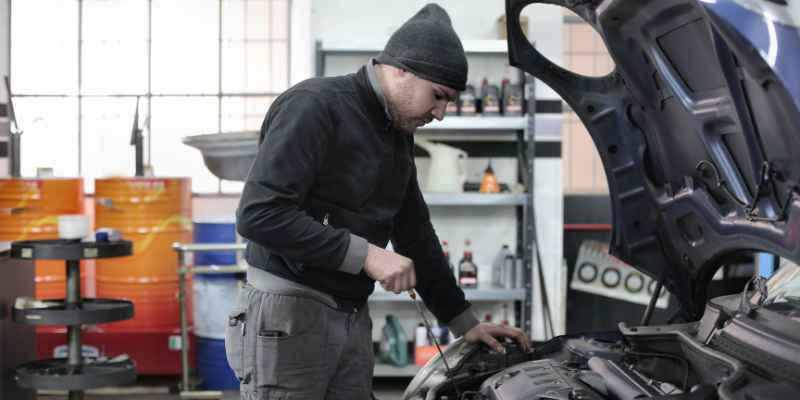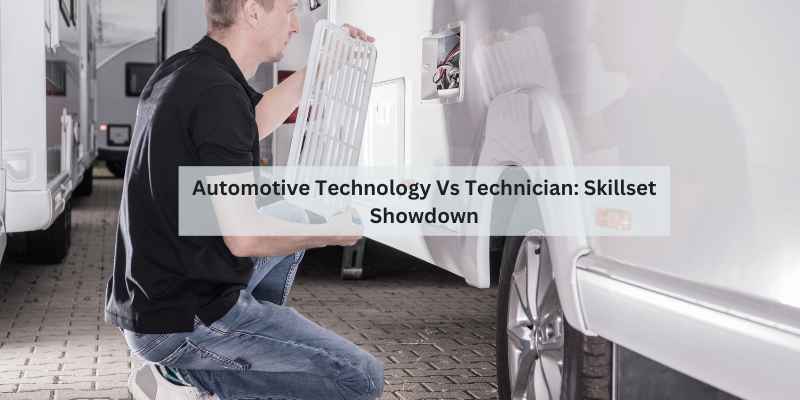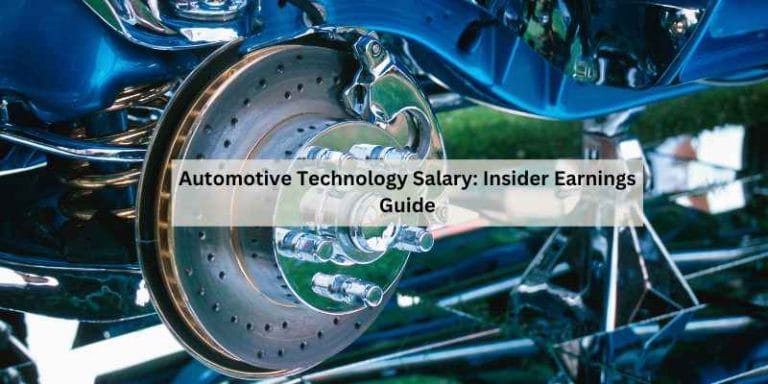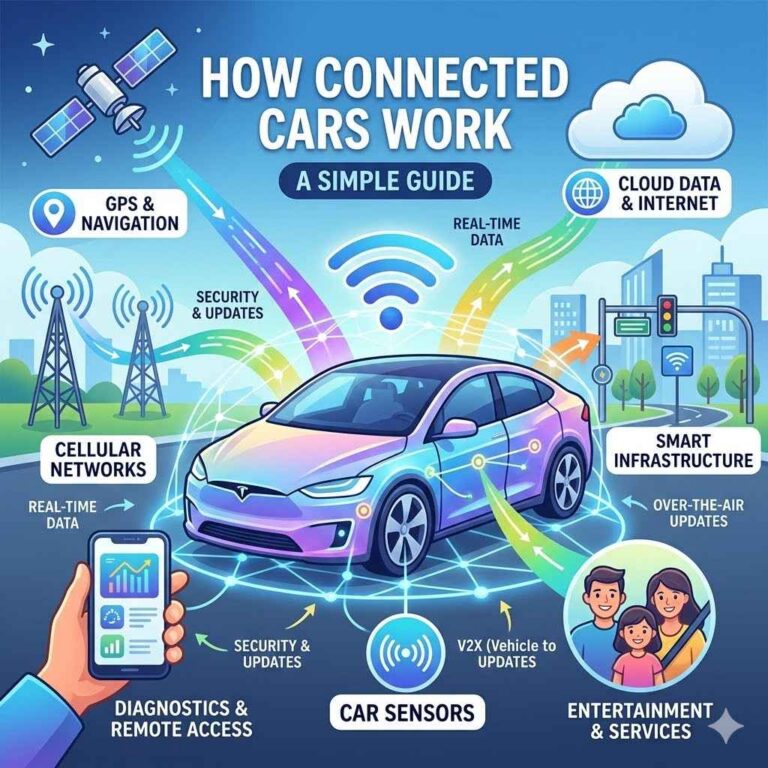Automotive Technology Vs Technician: Skillset Showdown
Automotive Technology focuses on using computers and technology for car diagnosis and repairs. Automotive Technicians inspect, maintain, and repair vehicles, utilizing a higher level of expertise than mechanics.
Today’s technicians require nuanced skills to handle mechanical tasks and diagnose computer-related issues effectively. Their role is more advanced and specialized compared to traditional mechanics, who primarily focus on hands-on tasks like oil changes and brake pad replacements. As vehicles become more technologically advanced, the demand for skilled Automotive Technicians continues to rise, highlighting the importance of staying updated with the latest automotive technology trends and diagnostic tools.
Evolution Of Automotive Expertise
The evolution of automotive expertise has seen a shift from traditional automotive mechanics to modern automotive technicians. While mechanics focus on hands-on tasks such as repairing and maintaining vehicles, technicians utilize advanced technology and computer diagnostics to troubleshoot and fix complex issues in cars and trucks.
This transition reflects the increasing reliance on technological skills in the automotive industry.
From Wrenches To Widgets
Automotive technology has come a long way since the first cars hit the road. In the early days, mechanics would use only their trusty wrenches and other hand tools to diagnose and repair vehicles. But as cars became more complex and computerized, the need for more advanced tools and technology became apparent. Today, automotive technicians use a variety of specialized tools and equipment, including diagnostic scanners, oscilloscopes, and even augmented reality technology to diagnose and repair vehicles.
The Mechanic And Technician Divide
While the terms “mechanic” and “technician” are often used interchangeably, there is a subtle difference between the two. A mechanic is typically someone who specializes in hands-on work, such as changing oil and brake pads. A technician, on the other hand, is someone who uses advanced technology and computerized diagnostic tools to troubleshoot and repair vehicles. In many cases, technicians have received specialized training and certification to work with these advanced tools and technology.
The Future Of Automotive Expertise
As cars continue to become more advanced, the need for skilled automotive technicians will only continue to grow. In addition to mastering the latest diagnostic tools and technology, tomorrow’s technicians will also need to be well-versed in areas such as electric and hybrid vehicle technology, autonomous driving systems, and other emerging automotive trends. By staying up-to-date with the latest advancements in automotive technology, today’s technicians can position themselves for success in the years to come.
Defining The Roles
Automotive Technology involves advanced computer diagnostics, while Automotive Technicians focus on hands-on repairs like changing oil and brakes. Technicians require a higher level of expertise to troubleshoot vehicle computer issues and perform mechanical tasks. The roles of a technician and a mechanic each play a vital part in ensuring vehicles operate smoothly.
Mechanic’s Manual Mastery
A mechanic excels in hands-on tasks such as changing oil and brake pads.
Technician’s Tech Triumphs
An automotive technician is a skilled professional who uses computers and technology to diagnose and repair vehicles.
Skill Sets In The Spotlight
In the realm of automotive expertise, Automotive Technology delves into advanced computer diagnostics, while Automotive Technicians excel in hands-on mechanical tasks. The distinction lies in the nuanced skill set required for modern technicians to tackle both traditional and high-tech vehicle maintenance challenges effectively.
Mechanical Muscle
Automotive technicians possess hands-on mechanical skills, excelling in tasks such as engine repair, brake maintenance, and suspension system troubleshooting. Their ability to wield tools and perform physical tasks sets them apart, ensuring that vehicles are in top-notch condition.
Technical Acumen
With a strong foundation in automotive technology, technicians leverage their technical acumen to diagnose and repair complex vehicle systems. They are adept at using diagnostic tools and interpreting data to identify and resolve issues with modern vehicles’ intricate electronic and computerized components.
Education And Certification
When it comes to pursuing a career in the automotive industry, education and certification play a crucial role in shaping the skills and expertise of professionals. Understanding the pathways to professionalism and the significance of ASE certification is essential for aspiring automotive technicians.
Pathways To Professionalism
Aspiring automotive technicians can pursue various educational pathways to enter the industry. These include completing a post-secondary automotive technology program at a vocational school, community college, or technical institute. Additionally, some individuals opt for apprenticeships or on-the-job training to gain hands-on experience under the guidance of seasoned professionals.
Ase Certification: A Closer Look
The National Institute for Automotive Service Excellence (ASE) offers certification programs that validate the skills and knowledge of automotive technicians. These certifications cover different areas of specialization, including engine repair, electrical systems, brake systems, and more. Automotive technicians can pursue ASE certifications to demonstrate their expertise and commitment to professional development.
On The Job

Automotive Technology involves using advanced tools and technology for vehicle diagnostics, while an Automotive Technician focuses on hands-on repairs and maintenance. Technicians handle mechanical tasks, whereas technology experts utilize computerized systems for vehicle analysis. These distinct roles showcase the evolving skill set in the automotive industry.
A Day In The Life Of A Mechanic
Mechanics start their day by examining vehicles and identifying issues through hands-on inspections. They use tools and equipment to perform maintenance and repairs on various automotive components. From changing oil to replacing brake pads, their work involves physical labor and precision.
A Day In The Life Of A Technician
Technicians, on the other hand, rely heavily on technology and diagnostic equipment. Their day begins with analyzing complex vehicle systems using specialized software and computerized tools. They are adept at interpreting electronic data and performing intricate tasks to troubleshoot and repair modern vehicles.
Tools Of The Trade
When it comes to automotive technology and automotive technicians, the tools of the trade play a crucial role in their respective fields. In the Mechanic’s Toolbox, traditional hand tools and diagnostic equipment are essential, while Tech-Savvy Tools for Technicians encompass advanced electronic diagnostic devices and software.
In The Mechanic’s Toolbox
Automotive mechanics rely on a range of traditional hand tools such as wrenches, screwdrivers, sockets, and pliers. These tools are essential for tasks like repairing engines, replacing brake pads, and changing oil. In addition to these basics, mechanics also use specialty tools tailored to specific tasks, such as ball joint separators, bearing pullers, and torque wrenches.
Tech-savvy Tools For Technicians
Automotive technicians, on the other hand, utilize an array of high-tech equipment to diagnose and troubleshoot vehicle issues. This includes computerized diagnostic tools, oscilloscopes, scan tools, and multimeters. These tools allow technicians to interface with the vehicle’s onboard computer system and pinpoint problems accurately. Moreover, the use of sophisticated software programs enables technicians to access manufacturer-specific technical information and repair databases, facilitating precise and efficient repairs.
The Diagnostic Dilemma
The Diagnostic Dilemma in automotive technology versus automotive technician lies in the approach to troubleshooting vehicle issues.
Mechanic’s Approach To Troubleshooting
Mechanics typically rely on hands-on experience and visual inspection to diagnose problems in vehicles.
Technician’s Analytical Strategies
Technicians utilize advanced diagnostic tools and computer systems to pinpoint complex issues accurately.
The Future Of Automotive Service
The future of automotive service lies in the evolution of Automotive Technology versus traditional Automotive Technicians. While mechanics focus on hands-on tasks like oil changes, technicians leverage advanced computer diagnostics for precise car repairs. This shift towards technology reflects the industry’s demand for expertise in both mechanical and digital automotive systems.
Emerging Technologies
The automotive industry has been rapidly changing with the introduction of new technologies. In the future, we can expect to see even more advanced technologies that will transform the way we service and maintain vehicles. One of the most significant emerging technologies is the electric vehicle (EV) and hybrid electric vehicle (HEV) technology. These vehicles require specialized training and equipment to service, and technicians will need to be trained in these areas to keep up with the demand.
Another emerging technology is the autonomous vehicle (AV) technology. AVs have the potential to revolutionize the automotive industry and change the way we think about transportation. However, these vehicles will require a new set of skills and knowledge to service and maintain. Technicians will need to understand the complex software and hardware that powers these vehicles, as well as the sensors and cameras that allow them to operate.
Adapting Skill Sets For Tomorrow
As the automotive industry evolves, technicians will need to adapt their skill sets to keep up with the changing landscape. They will need to be proficient in the latest diagnostic and repair techniques, as well as have a deep understanding of the new technologies that are being introduced.
In addition to technical skills, technicians will also need to develop soft skills such as communication, problem-solving, and critical thinking. These skills will be essential as vehicles become more complex and require more collaboration between technicians and engineers.
To prepare for the future of automotive service, technicians will need to stay up-to-date with the latest training and certifications. They will need to be lifelong learners and be willing to adapt to new technologies and techniques as they emerge.
In conclusion, the future of automotive service is exciting, but it will require technicians to be adaptable and willing to learn new skills. With the right training and education, technicians can thrive in this changing industry and provide excellent service to customers.

Frequently Asked Questions
What Is The Difference Between Automotive Technology And Automotive Mechanics?
Automotive technology focuses on advanced computer diagnostics, while automotive mechanics perform hands-on repairs. Technology involves computerized diagnostics, while mechanics work with physical repairs.
What Is An Automotive Technician?
An automotive technician is a professional who inspects, maintains, and repairs cars and light trucks. They use computers and technology to diagnose issues and perform repairs, making them repair shop wizards. Technicians require a higher level of expertise than mechanics to perform hands-on tasks as well as diagnose and troubleshoot vehicle computer issues.
The skill set of a technician is more nuanced, making them experts in automotive repair.
Is A Technician Higher Than A Mechanic?
Technicians are typically higher skilled than mechanics, as they require expertise in computer diagnostics and mechanical tasks.
What Is The Highest Level Of Automotive Technician?
The highest level of automotive technician is an ASE Master Technician, considered an expert in automotive repair. They have passed eight tests and may also hold advanced certifications, equivalent to medical specialists like Cardiologists or Surgeons.
Conclusion
In the realm of automotive, the distinctions between technology and technicians are clear. While mechanics focus on hands-on tasks, technicians delve into complex computer diagnostics. Both play crucial roles in vehicle maintenance and repair, reflecting the evolving nature of the automotive industry.
Embracing both aspects ensures optimal service delivery.







